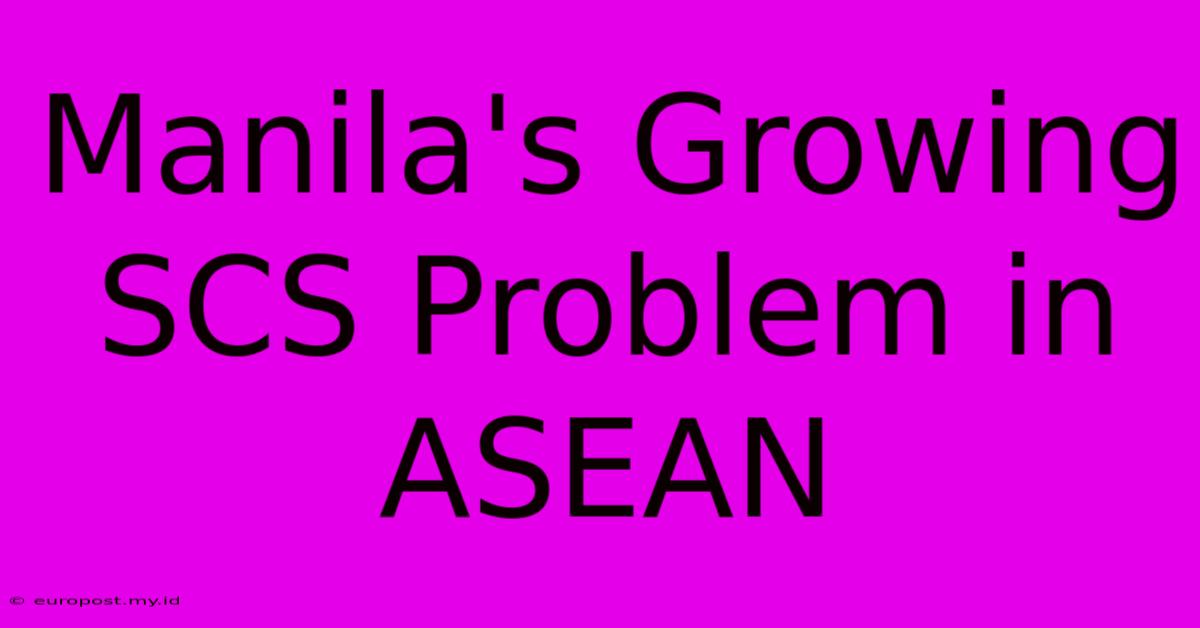Manila's Growing SCS Problem In ASEAN

Discover more in-depth information on our site. Click the link below to dive deeper: Visit the Best Website meltwatermedia.ca. Make sure you don’t miss it!
Table of Contents
Manila's Growing SCS Problem in ASEAN: Navigating a Complex Geopolitical Landscape
The South China Sea (SCS) dispute presents a significant and evolving challenge for the Philippines, a key member of the Association of Southeast Asian Nations (ASEAN). Manila's strategic location, coupled with its overlapping maritime claims with China, necessitates a careful and nuanced approach to navigating this complex geopolitical landscape. This article will delve into the intricacies of the Philippines' SCS problem within the broader ASEAN context, examining the historical context, current tensions, and potential solutions.
Historical Context: A Legacy of Disputes
The SCS dispute isn't a recent phenomenon. Competing claims over islands, reefs, and maritime resources have existed for decades, fueled by overlapping historical interpretations and assertions of sovereignty. The Philippines' claims are based on its archipelago's proximity to these features and its adherence to the United Nations Convention on the Law of the Sea (UNCLOS). However, China's expansive "nine-dash line" claim, which encompasses a vast portion of the SCS, directly contradicts the Philippines' claims and those of several other ASEAN nations. This historical baggage continues to shape the present-day tensions.
The Impact of China's Assertiveness
China's increasingly assertive actions in the SCS, including the construction of artificial islands, the militarization of these features, and the harassment of Filipino fishermen, have significantly escalated tensions. These actions directly challenge the Philippines' sovereign rights and undermine regional stability. The incident at Scarborough Shoal in 2012, where Chinese vessels effectively blocked Filipino access, stands as a stark example of this assertiveness.
The ASEAN Factor: A Balancing Act
ASEAN's role in addressing the SCS dispute is crucial. However, the organization's consensus-based decision-making process often struggles to effectively confront China's actions. The desire to maintain good relations with China, a major economic partner for many ASEAN members, sometimes overshadows the need for a strong, unified response to China's encroachment. This internal dynamic within ASEAN presents a significant challenge for the Philippines, which must balance its need for regional solidarity with its direct confrontation with China's actions.
Navigating the Challenges of Multilateralism
The Philippines' efforts to utilize multilateral frameworks like ASEAN to resolve the SCS issue have been met with mixed results. While ASEAN has adopted the Declaration on the Conduct of Parties in the South China Sea (DOC), its implementation remains weak. The ongoing negotiations for a legally binding Code of Conduct (COC) are crucial but face significant obstacles, largely due to China's reluctance to fully commit to a framework that would constrain its actions.
The Philippines' Response: A Multi-pronged Strategy
Faced with this challenging situation, the Philippines has adopted a multi-pronged strategy. This includes:
- Strengthening its alliances: The Philippines has deepened its security ties with the United States, seeking enhanced military cooperation and support for its maritime claims.
- Pursuing legal avenues: The Philippines successfully won its case against China before the Permanent Court of Arbitration in 2016, affirming its sovereign rights in the area. However, China has refused to acknowledge the ruling.
- Promoting regional cooperation: Despite the challenges, the Philippines continues to engage with ASEAN and other regional partners to pursue diplomatic solutions and promote a rules-based order in the SCS.
- Domestic capacity building: Investing in its maritime capabilities, including its coast guard and navy, is crucial for protecting its sovereign rights and the livelihoods of Filipino fishermen.
The Future of Manila's SCS Problem: Uncertainty and the Path Forward
The future of the Philippines' SCS problem remains uncertain. The ongoing tensions highlight the need for a concerted, multi-faceted approach that balances diplomatic engagement with the assertive protection of its sovereign rights. While ASEAN’s role remains vital, the limitations of its consensus-based approach require the Philippines to pursue strategic alliances and actively engage with other regional and international actors to safeguard its interests in the SCS. The successful navigation of this complex situation will require diplomatic skill, strategic partnerships, and a steadfast commitment to upholding international law. The long-term solution necessitates a commitment from all parties involved to respect international law and engage in meaningful dialogue to find a peaceful resolution that respects the legitimate rights and claims of all involved.

Thank you for taking the time to explore our website Manila's Growing SCS Problem In ASEAN. We hope you find the information useful. Feel free to contact us for any questions, and don’t forget to bookmark us for future visits!
We truly appreciate your visit to explore more about Manila's Growing SCS Problem In ASEAN. Let us know if you need further assistance. Be sure to bookmark this site and visit us again soon!
Featured Posts
-
Late Goal Secures Scotland 1 0 Win Over Croatia
Nov 16, 2024
-
Tilak Varma Wins Best Fielder Award
Nov 16, 2024
-
1 0 Win Scotland Defeats Croatia In Nations League
Nov 16, 2024
-
Surprise Moon Knight In Gladiator 2
Nov 16, 2024
-
Fast Telescope A Soft Power Story
Nov 16, 2024
